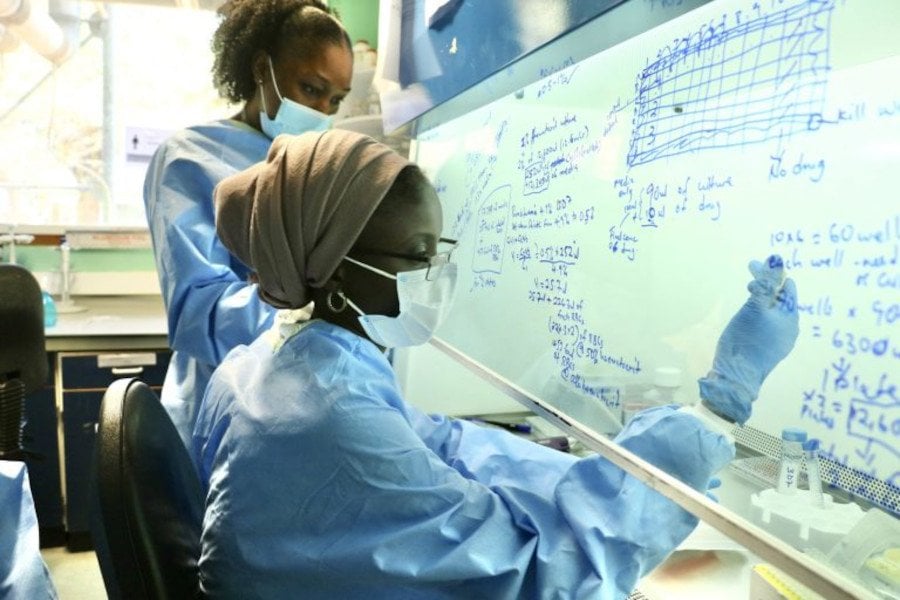
Credit: Mamud Joof/MRCG at LSHTM
The Malaria Population Biology (MPB) Group at the Medical Research Council Unit The Gambia at the London School of Hygiene & Tropical Medicine (MRCG at LSHTM) held an intensive training on Ex-vivo drug sensitivity testing for the most deadly malaria parasite, Plasmodium falciparum, from 14th to 18th February 2022.
The week-long training was funded by the European and Developing Countries Clinical Trials Partnership (EDCTP) Senior Fellowship-Plus project on Emerging Genomic Selection and Anti-Malarial Tolerance in Africa (EGSAT). The goal was to strengthen the capacities of MSc, doctoral and Postdoc students from Senegal (IRESSEF), Ghana (WACCBIP), and Nigeria (NIMR) to conduct new and standardised ex-vivo efficacy tests of current and new drugs against malaria. The trainees had the opportunity to gain practical experience on parasite culture, flow cytometry, ex-vivo drug assays, and data analysis.
Associate Professor Alfred Amambua-Ngwa is the Principal Investigator of the EGSAT project. He combines cell biology, population genomics, and epidemiology for his research. He also leads components of large scientific capacity development programs in Africa funded by various donors.
A’Prof Amambua-Ngwa said, “Standardising ex-vivo testing across the African continent will allow different regions and malaria control programs to compare the effect of current drugs on the malaria parasite population. We need this to preserve the efficacy of current drugs and pre-empt drug resistance, which unfortunately is already emerging and has plagued the fight against malaria for more than half a century. EGSAT will monitor both the genes and phenotypes of malaria parasites for any changes as we scale interventions for malaria elimination”.
Fatoumatta Bojang, Scientific Officer at the MRCG at LSHTM and lead facilitator of the training said, “The students will be able to replicate what they have learned during the workshop in a standardised way. This will facilitate the sharing of data from new ex-vivo drug assays and harmonise approaches by the respective national malaria programmes on new strategies for interventions.”
Ndeye Khaddy Sow is a PhD student at Université Cheikh Anta Diop in Senegal, and one of the four trainees from the region. She spoke about the significance of the training, adding “I have never done parasite culture, and being able to use scientific equipment correctly and safely, making observations, taking measurements, and carrying out well-defined scientific procedures was an amazing experience. The hands-on experience with parasite culture, ex-vivo drug assays, and data analysis were very important.”
Research Assistant and an MSc Student at the University of Accra in Ghana, Edem Adika shared similar feedback. “The hands-on exercise was delivered professionally. The instructors clearly demonstrated their knowledge and expertise, and it was an honour to learn from them. I have learnt so much which I will put into practice moving on in my career”, he said.
He also expressed his appreciation of the MRGC at LSHTM’s state-of-the-art laboratory facilities saying, “I am highly impressed with the facilities at the Unit. I must admit they are of a high standard and suitable for carrying out quality research from the little exposure I have had.”
The EGSAT project will explore new methods for in vitro testing and molecular association analysis that will support the research training of postgraduate students and a Postdoc in cell biology and genomics research related to malaria parasite evolution and drug selection in Africa.
It will also contribute to the EDCTP’s objectives by fostering regional collaboration on malaria research, particularly within the West African Network of Excellence for TB, AIDS, and Malaria (WANETAM) and the Pathogen Diversity Network Africa (PDNA), bringing together researchers from The Gambia, Senegal, Ghana, and Nigeria. This allows for multi-linguistic scientific interactions across a malaria transmission gradient (low in Gambia and Senegal and high in Ghana and Nigeria)
The project will foster strong collaboration with the National Malaria Control Programme (NMCP) in The Gambia, which runs the routine surveillance of drug efficacy. A platform for material and data sharing that already exists will be re-enforced across all sites. This includes international partners such as Institut Pasteur de Dakar, Nigeria Institute of Medical Research (NIMR), the Institute for Health Research, Epidemiological Surveillance and Training (IRESSEF), and the West African Centre for Cell Biology of Infectious Pathogens (WACCBIP).
If you enjoyed this article and would like to build a career in global health, we offer a range of MSc programmes covering health and data, infectious and tropical diseases, population health, and public health and policy.
Available on campus or online, including flexible study that works around your work and home life, be part of a global community at the UK's no.1 public health university.
